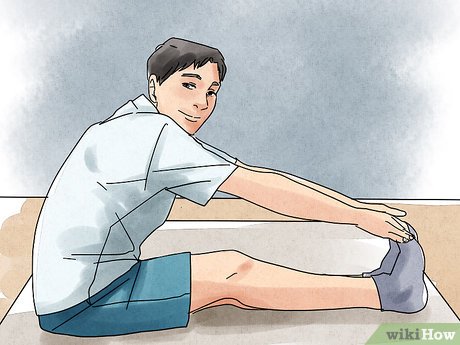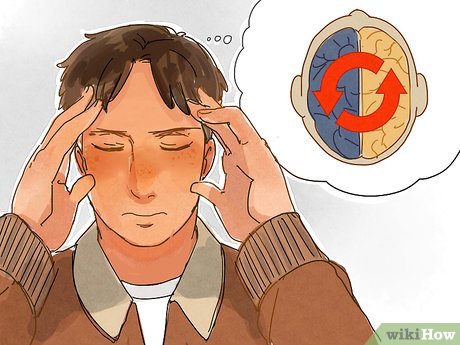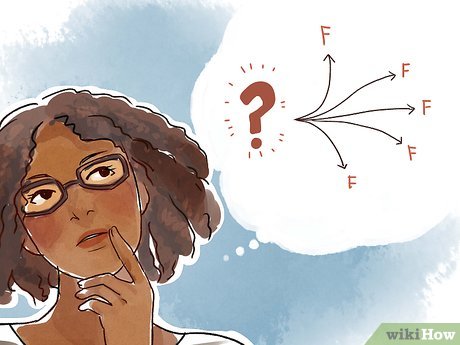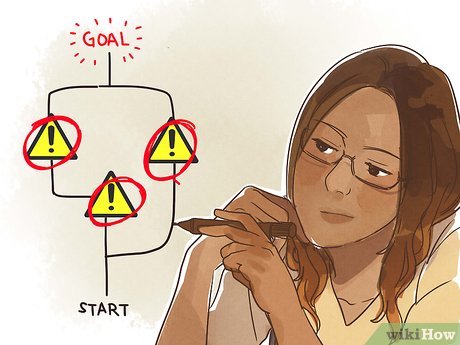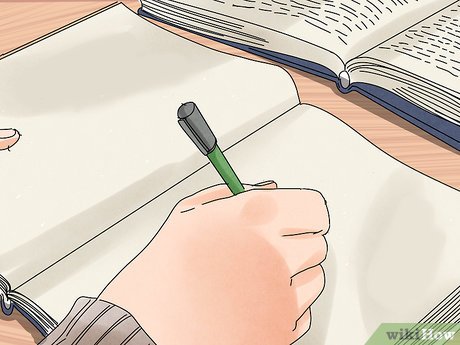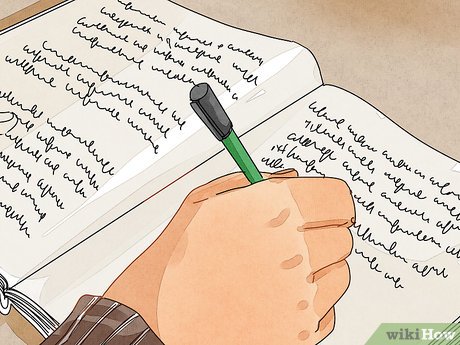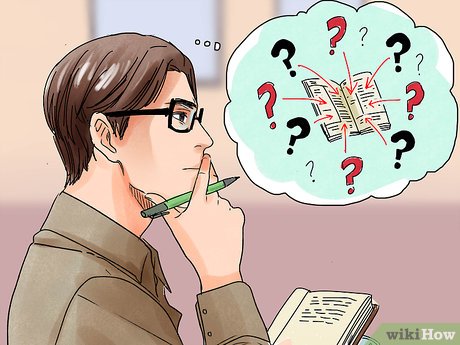How to Learn Faster
Part 1 of 4:
Preparing Your Body
-
 Get plenty of sleep. A lot of the time, there's nothing wrong with you or how you study or learn: your brain just can't hold the information because your body isn't getting something that it needs. Often, that need is more sleep. You'll want to be sure to get plenty of sleep if you want your brain to be alert enough to absorb information. Just drinking an extra cup of coffee isn't going to work. This means you'll want to stop doing those late night study sessions. Instead, go to bed early, get a few hours of sleep, and then get up early so that you can study more on a well-rested brain.
Get plenty of sleep. A lot of the time, there's nothing wrong with you or how you study or learn: your brain just can't hold the information because your body isn't getting something that it needs. Often, that need is more sleep. You'll want to be sure to get plenty of sleep if you want your brain to be alert enough to absorb information. Just drinking an extra cup of coffee isn't going to work. This means you'll want to stop doing those late night study sessions. Instead, go to bed early, get a few hours of sleep, and then get up early so that you can study more on a well-rested brain.- Studies have actually revealed that while we sleep, the brain is flushed with a fluid that cleans it of toxins.[1] When we don't get enough sleep, our brains are so overloaded with junk that it becomes difficult for the brain to function correctly.
- How much is enough sleep really depends on you and how your body works. Seven to eight hours is what is recommended for most adults[2], but some people need less and some people need more. You should be able to feel awake and alert through most of the day, without the aid of coffee. If you're tired before four or five in the afternoon, then you're probably not getting enough sleep (or you might be getting too much).
-
 Eat enough food. When you're hungry, your brain will have a really hard time absorbing any information. It's hard to focus when all your body can tell you is that your stomach is empty. Make sure that you get enough food for all of the major meals. You might even want to choose something healthy to snack on while you study as well as during any classes or tests you might have to take.
Eat enough food. When you're hungry, your brain will have a really hard time absorbing any information. It's hard to focus when all your body can tell you is that your stomach is empty. Make sure that you get enough food for all of the major meals. You might even want to choose something healthy to snack on while you study as well as during any classes or tests you might have to take.- It's also a good idea to make sure that you're eating healthy foods. Junk food doesn't give your body the nutrients it needs to perform at its best. Snack on some almonds or a couple of carrots in order to feel alert and focused, instead of bloated and tired.
-
 Drink plenty of water. Your body is at its best when it's well hydrated. When you don't get enough water, you won't be able to focus. You can easily become distracted, whether you realize it or not, by your thirst. It can even lead to things like a headache, making it even harder for you to learn.
Drink plenty of water. Your body is at its best when it's well hydrated. When you don't get enough water, you won't be able to focus. You can easily become distracted, whether you realize it or not, by your thirst. It can even lead to things like a headache, making it even harder for you to learn.- Different bodies need different amounts of water to stay hydrated. The "eight glasses a day" that you hear recommended is just a rough estimate. The best way to tell if you're getting enough water is to look at the color of your urine. If it's pale or clear, you're drinking enough. Any darker color means you could use more water.
-
 Get exercise. Of course you know that exercise is good for your body in lots of ways, but did you know that it can also help you learn faster? Some studies have found that light exercise while studying can help you to learn faster. [3] For people who are very physical and active, being forced to stay still for too long can also make it hard to stay focused, so exercising while studying can also be helpful in that way.
Get exercise. Of course you know that exercise is good for your body in lots of ways, but did you know that it can also help you learn faster? Some studies have found that light exercise while studying can help you to learn faster. [3] For people who are very physical and active, being forced to stay still for too long can also make it hard to stay focused, so exercising while studying can also be helpful in that way.- For example, try walking around a large room while you read your textbook. Record your class lectures and listen to the recordings while you use an elliptical machine at the gym. There are lots of options. Just remember to keep the exercise light and do it while you study.
-
 Teach your brain to learn. Learning quickly is a habit and you might need to work to retrain your brain for good habits instead of bad ones. Improve your focus by doing complex tasks without breaks (even if they're unrelated). Set aside a time and place that's just for learning and keep that place sacred. Perhaps most importantly, find a way to make learning fun for you. This will make your brain want to do more and you won't struggle to learn quite so much.
Teach your brain to learn. Learning quickly is a habit and you might need to work to retrain your brain for good habits instead of bad ones. Improve your focus by doing complex tasks without breaks (even if they're unrelated). Set aside a time and place that's just for learning and keep that place sacred. Perhaps most importantly, find a way to make learning fun for you. This will make your brain want to do more and you won't struggle to learn quite so much.- For example, pursue learning about the subjects that you do enjoy. Eventually, your brain will master the learning skills and you can apply those skills to subject areas that you don't enjoy too.
Part 2 of 4:
Learning to Learn
-
 Pick a goal. Look at the changes you want to make to Measurably Improve Your Quality of Life. Which goals require you to learn more before you can confidently make the change you want? Look for a goal you could start on now, without too much time required. In this case, the goal we have chosen is to take better care of our body. Then we are going to break it down. What elements go along with taking better care of our body?
Pick a goal. Look at the changes you want to make to Measurably Improve Your Quality of Life. Which goals require you to learn more before you can confidently make the change you want? Look for a goal you could start on now, without too much time required. In this case, the goal we have chosen is to take better care of our body. Then we are going to break it down. What elements go along with taking better care of our body?- Study as early as possible.
- Get plenty of sleep
- Eat healthy food
- Drink plenty of water
- Get exercise
-
 Research options for learning.
Research options for learning.- Brainstorm criteria for which options you are attracted to and which you are not. Are you interested in researching on the internet? Do you want to talk with a nutritionist or a fitness instructor? If you have difficulty when paying attention while reading, would magazine articles be an effective option for learning?
- Trust your intuition. If heading down a certain path doesn't feel right, don't go that way! If you begin reading on ways to improve your sleep habits, and the information is not something you would be willing to use in your own life, then stop reading, and find a different resource. Do not continue simply because it is information coming from an 'expert' or because 'everyone is doing it'. The information has to be useful to you.
- Refine your goal with research. As you begin to look into ways to take better care of your body you may discover there is one element that you really want to focus on. This narrows your goal from 'I want to take better care of my body' to 'I want to take better care of my body by eating a healthier diet.'
- Find someone who has done what you want to do and have them show you. If you know someone who has changed elements of their lifestyle, such as exercising more or implementing a healthier way of eating, talk to them. Find out what they did, how they did it and where they found their information.
- Do research on the internet, take a class, interview others, and find a mentor. Try out different varieties of learning to see which one works best for you.
-
 Choose the best option.
Choose the best option.- Pick something that is possible to do in your environment, that you can work on constructively within your timeframe, and that you can do successfully with the energy and attention you have. Do not decide to take a nutrition class if you are already pressed for time and won't have time to attend. Instead, take a smaller piece, such as following a nutritional plan. Whatever it is, it needs to be something you can effectively add to your life.
- Consider time constraints, geographic constraints, and your mental state. Do not bring more stress to your life by taking on more than what works for your life circumstances. Learning should add to the quality of your life, not take away from it.
- Schedule a time of day for learning and practicing what you learn. Having a set time for learning can help motivate you to continue the process.
- Develop the habit of paying attention to what you want to learn or improve upon. "Emotions drive attention. Attention drives learning." Pay attention to your emotional reactions. If you are researching exercise options and find yourself resisting, explore why. What is it about exercising that is causing the reaction? There is a reason for resisting the learning experience.
- Don't become overwhelmed with all the choices. Sometimes we become distracted and overwhelmed by wanting to choose the 'right' option. There is no 'right' or 'wrong'; it is about what works for you. Just pick one and try it! If it doesn't work, then pick another one.
-
 Experiment with learning. To effectively conduct an experiment you need to have a plan, a way to evaluate if the experiment is working and a time to reflect on the process and outcome. The learning process works the same way.
Experiment with learning. To effectively conduct an experiment you need to have a plan, a way to evaluate if the experiment is working and a time to reflect on the process and outcome. The learning process works the same way.- Setting a specific criteria allows you to see if you have met it or not. When deciding on a nutritional plan do I want it to include 3 meals a day or do I need it to cover several smaller meals throughout the day?
- Be sure to have a method for keeping track of progress. Use whatever tools you have! Notebooks, phone, apps, computer, internet, calendar, blogs, etc.
- Keep reflecting on your progress. Do I still need more information or do I have what I need to begin a new sleep routine?
- Set milestones and stick to them. I want to find 3 new healthy dinner recipes to incorporate into my nutrition plan.
-
 Evaluate your results and milestones.
Evaluate your results and milestones.- Did you reach them? Did you learn enough to implement a new exercise plan? Have you found an effective way to improve your sleep habits?
- A reminder in your calendar will prompt you to reflect. Set a 'check-in' date to evaluate the information you have learned; see if it is effective; is there is more you have realized that you need to know. What worked and what didn't? Why?
-
 Refine your approach. If the learning approach you chose worked, then keep going with it. If not, go back and pick a different one and start experimenting!
Refine your approach. If the learning approach you chose worked, then keep going with it. If not, go back and pick a different one and start experimenting!
Part 3 of 4:
Learning in School
-
 Pay attention when you learn things for the first time. The best way to learn faster is to make sure that you're really paying attention when things are explained to you the first time. Even the smallest break in your focus can cause the information not to settle properly in your brain. Unfortunately, there are few tricks for this: you'll mostly need to learn how to maintain willpower.
Pay attention when you learn things for the first time. The best way to learn faster is to make sure that you're really paying attention when things are explained to you the first time. Even the smallest break in your focus can cause the information not to settle properly in your brain. Unfortunately, there are few tricks for this: you'll mostly need to learn how to maintain willpower.- Try listening with the idea that you will have to answer a question immediately about the material, such as your teacher calling on you, or so that you can repeat the information back to yourself. In fact, if you're on your own, repeating the information back to yourself (paraphrased and in your own words) can help to anchor the information in your brain.
-
 Take notes. Taking notes is another great way to maintain your focus as you learn the material the first time. Taking notes not only forces you to think about the material you're learning, it also give you a framework to study from later.
Take notes. Taking notes is another great way to maintain your focus as you learn the material the first time. Taking notes not only forces you to think about the material you're learning, it also give you a framework to study from later.- Taking notes doesn't mean writing down everything that is said. All you have to do is write down the broad outline, with specific information when you know it's important. Write down major facts and any explanations that you either have a hard time understanding or you know you won't remember because they are very complicated.
-
 Participate in class. Stay active in your learning experience. This will not only help you stay focused, it will also help your brain absorb the information better because it becomes a multi-sensory experience, rather than you just listening to someone talk. There are lots of ways to participate in your learning experience, from getting active in group work to asking questions during the lecture.
Participate in class. Stay active in your learning experience. This will not only help you stay focused, it will also help your brain absorb the information better because it becomes a multi-sensory experience, rather than you just listening to someone talk. There are lots of ways to participate in your learning experience, from getting active in group work to asking questions during the lecture.- Try to answer questions when the teacher asks. Don't worry about being wrong: this is a learning experience and being wrong sometimes is a part of the process.
- When you're split up into groups in order to do activities, reading, or discussion, really embrace the experience and participate. Don't just sit quietly and do as little as possible. Engage your fellow students and ask them questions, give your opinions, and enjoy the experience.
- Ask questions when you don't understand or want to know more. Asking questions is another great way to stay focused as you learn material, plus it will also help make sure that you really understand what you're learning. When you don't understand what your teacher said or when you think something is interesting and want to know more, don't be afraid to ask.
-
 Create a helpful environment. If your lab partner is a huge nuisance or your place to study at home is in front of the TV, then it's probably no surprise that you're having trouble learning quickly. You'll need a quiet environment that's dedicated to studying if you want to give your brain the best chance at learning the information. Having a quiet, distraction-free environment means that you won't get distracted. Having a place set aside for studying and learning can also help, because it triggers your brain into working in a particular way.
Create a helpful environment. If your lab partner is a huge nuisance or your place to study at home is in front of the TV, then it's probably no surprise that you're having trouble learning quickly. You'll need a quiet environment that's dedicated to studying if you want to give your brain the best chance at learning the information. Having a quiet, distraction-free environment means that you won't get distracted. Having a place set aside for studying and learning can also help, because it triggers your brain into working in a particular way.- If your classroom environment is a problem, ask your teacher for help. You might be able to move seats or work with someone else. If your home environment is the problem, find unique places to study. You can go to a library if there's one close enough. You can also do things like study in your bathroom or really early in the morning, if you have noisy roommates.
-
 Work with your learning style. Learning styles are the different ways in which our brains best absorb information. There are many different learning styles and while we all can learn using every learning style, there are usually one or two that work best for an individual. You can take online tests to help gauge what your learning style might be, but if you have a teacher available to help you, they should be able to help you figure it out. You can even talk to them about adding more of that learning style to how they teach.
Work with your learning style. Learning styles are the different ways in which our brains best absorb information. There are many different learning styles and while we all can learn using every learning style, there are usually one or two that work best for an individual. You can take online tests to help gauge what your learning style might be, but if you have a teacher available to help you, they should be able to help you figure it out. You can even talk to them about adding more of that learning style to how they teach.- For example, if you find that you learn best when you can look at charts and graphs, you might be a visual learner. Try studying by drawing up your own infographics, to help you remember the information more.
- Do you find that you remember how things sound or that you can clearly remember what you were reading as you listened to a particular song? If so, you might be an auditory learner. Try recording your class lectures to listen to before and after you study, or even while you study if the information is very clearly the same.
- Do you sit in the classroom feeling like you might burst because you need to go for a run? Do you absent-mindedly tap your foot while you listen to lectures? You might be a physical learner. Try fiddling with a small object during class or go for a walk while you study, to help you learn faster.
-
 Learn in the right way for the type of material you're working with. Different kinds of subjects are learned better in different ways. You might not be studying for the subject you want to learn in the most helpful way. Adjust how you study so that you're learning the right skills in a way that works with your brain.
Learn in the right way for the type of material you're working with. Different kinds of subjects are learned better in different ways. You might not be studying for the subject you want to learn in the most helpful way. Adjust how you study so that you're learning the right skills in a way that works with your brain.- For example, our brains are designed to learn language through interactions, listening, and usage. You'll learn English much faster if you immerse yourself and spend time speaking it, rather than just looking at flash cards. If you need more help learning English faster, see our article on the topic here.
- Another example is with learning math. Instead of just solving the same problems and looking at the same examples over and over again, look and solve lots of different problems that use the same skills.[4] Doing problems with related but different skills can also help solidify your understanding of what you're trying to learn.
-
 Get evaluated for a learning disability. If you really find that you can't focus while learning or that your brain doesn't seem to absorb any of the information, even with help and different techniques, then you might want to consider getting evaluated for a learning disability. There are lots of learning disabilities and most are fairly common (it is estimated that as much as 1 out of every 5 people in the US have one[5]). They don't mean that you're stupid or that there's something wrong with you, it just means that you learn in a slightly different way. Common learning disabilities include:
Get evaluated for a learning disability. If you really find that you can't focus while learning or that your brain doesn't seem to absorb any of the information, even with help and different techniques, then you might want to consider getting evaluated for a learning disability. There are lots of learning disabilities and most are fairly common (it is estimated that as much as 1 out of every 5 people in the US have one[5]). They don't mean that you're stupid or that there's something wrong with you, it just means that you learn in a slightly different way. Common learning disabilities include:- Dyslexia, which causes problems with reading. If you find that your eyes can't track properly as they move across a page, you might have dyslexia.
- Dyslexia-related disorders like dysgraphia and dyscalculia which cause similar problems with writing and math. If you find it difficult to write about something but you can easily talk about it, you might have dysgraphia. If you have trouble recognizing numbers or doing things like estimating costs, you might have dyscalculia.
- Central Auditory Process Disorder is another common learning disability which makes it difficult for sufferers to process sounds. It's similar to deafness, but without any hearing loss, and can lead to problems following conversations and focusing when background sounds are present.
Part 4 of 4:
Reviewing Material Efficiently
-
 Study as soon as possible and as frequently as you can. Of course, the more you study, the more you'll learn, so studying frequently is a good idea. But the sooner you start studying, the easier it will also be for you to remember everything. This means that you shouldn't start studying two or three days before an exam. Start work at least a week before an exam; and consider just studying continuously throughout the quarter if you feel like you need to.
Study as soon as possible and as frequently as you can. Of course, the more you study, the more you'll learn, so studying frequently is a good idea. But the sooner you start studying, the easier it will also be for you to remember everything. This means that you shouldn't start studying two or three days before an exam. Start work at least a week before an exam; and consider just studying continuously throughout the quarter if you feel like you need to.- It's a good idea to go back over old information at the same time that you go over the information from this week too. This will help keep those older ideas and skills fresh in your mind so that you can build on them.
-
 Get help from a tutor or your teacher. There's nothing wrong with getting some help and getting expert advice that's tailored to your situation. It can seriously help you learn much faster. Put aside your shyness and your pride and ask your teacher for help. If they don't have time to help you, they should be able to help you at least find a tutor.
Get help from a tutor or your teacher. There's nothing wrong with getting some help and getting expert advice that's tailored to your situation. It can seriously help you learn much faster. Put aside your shyness and your pride and ask your teacher for help. If they don't have time to help you, they should be able to help you at least find a tutor.- If you don't have money for a tutor, your teacher might be able to set you up with someone in your class who is doing well and can help you out.
- Many schools also have free tutoring centers. Check those out if they're available.
-
 Make a mind map to speed up your studying. A mind map is a great way to burn whatever information you're trying to learn straight into your brain. A mind map is a visual representation of what you're trying to learn. Use note-cards, pictures, and sheets of paper to write out facts, explanations, and organized concepts. Now, pin the items on a wall or lay them out on a floor, placing similar items together and using string or other items to indicate linked ideas and subjects. Study from this map instead of just looking at your notes.
Make a mind map to speed up your studying. A mind map is a great way to burn whatever information you're trying to learn straight into your brain. A mind map is a visual representation of what you're trying to learn. Use note-cards, pictures, and sheets of paper to write out facts, explanations, and organized concepts. Now, pin the items on a wall or lay them out on a floor, placing similar items together and using string or other items to indicate linked ideas and subjects. Study from this map instead of just looking at your notes.- When you go to take a test or write a paper, you'll be able to think back to your mind map and remember the information based on where it was and what it was connected to, just like how you can remember where things are on a geographical map.
-
 Memorize efficiently to lock in information fast. Memorizing isn't always the most foolproof technique, but it can help if you need to learn certain kinds of information very quickly. Memorization works best for lists of things, like what order actions should be done in or vocabulary words. Systematic memorization of more complex material is unlikely to be successful.
Memorize efficiently to lock in information fast. Memorizing isn't always the most foolproof technique, but it can help if you need to learn certain kinds of information very quickly. Memorization works best for lists of things, like what order actions should be done in or vocabulary words. Systematic memorization of more complex material is unlikely to be successful.- Try using mnemonics in order to learn information more quickly. Mnemonics are phrases or words with act like a key to larger amounts of information. For example, the mnemonic phrase "My very eccentric mother's jazz singing usually nauseates."
- Focus on small sections at a time. When you're learning and studying, it's a good idea to get as comfortable with small sets of information before moving on to new ones. You may feel like this goes slower but it's actually faster because you won't need to go back over the information as much. This is especially important when you're trying to memorize vocabulary, lists, and other similar types of information. Work on sets of words no more than 5-8 at a time before moving on to the next one.
-
 Give yourself context that you find interesting. When you have context for information, it becomes much easier for you to process. When that context is really interesting to you, it also makes the information easier to remember. Do your own research and look for experiences which can help you to contextualize the things you're trying to learn.
Give yourself context that you find interesting. When you have context for information, it becomes much easier for you to process. When that context is really interesting to you, it also makes the information easier to remember. Do your own research and look for experiences which can help you to contextualize the things you're trying to learn.- Let's say you're trying to learn English. Try watching a movie that you're interested in that covers a similar subject to the particular area of vocabulary that you're trying to learn at the moment. So, for example, if you're learning travel words, try watching Lost in Translation.
- Another example would be if you're trying to study for a history class. Find a documentary on the subject you're learning about or even one which just shows the country you're studying. Even just having visuals to go along with the stories will help you remember the information because it becomes easier to imagine.
Share by
Isabella Humphrey
Update 24 March 2020



